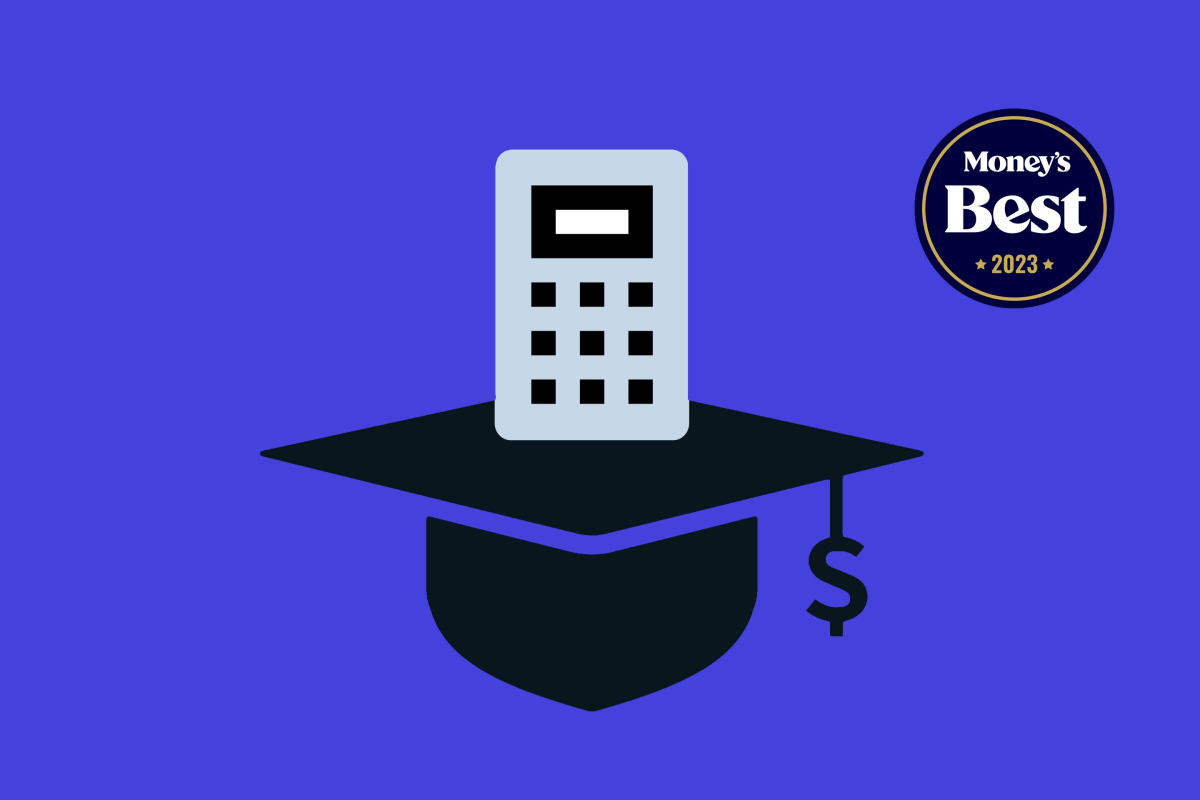Personal Finance
7 Best Student Loan Refinance Companies of 2023

Our Partners
Top Partner
Our Partner
View Rates
-
Rates starting at 4.83% fixed APR (with autopay) and 3.99% variable APR (with autopay)
-
Refinance undergraduate, graduate, and parent loans
-
Compare rates from multiple lenders quickly and easily
-
Check rates with no impact to your credit score
-
+650 credit score or
Our Partner
View Rates
-
No refinancing fees or pre-payment penalties
-
Checking rates will not impact your credit score
-
Accredited by the Better Business Bureau with an A+ rating
-
4.8 rating on Trustpilot.com
Our Partner
View Rates
-
Coming August 4, 2021: Associate’s degree loans refinanced
-
Fixed rates 3.29% – 5.43% APR
-
Choose from a 5, 8, 12, or 15-year repayment term
-
Easy online application
-
Find My Rate tool calculates savings with no impact to your credit score
-
No application fees or prepayment penalties
-
Trusted by its members for over 85 years
Our Partner
View Rates
-
Rates starting at 4.47% fixed APR (with autopay) and 4.59% variable APR (with autopay)
-
Refinance undergraduate, graduate, and parent loans
-
Refinance available for users with incomplete bachelor’s or associate’s degrees
-
Loan amounts between $5,000 and $500,000
-
Skip one payment per year with no penalty
-
Flexible loan terms from 5 to 20 years
-
Rates based in part on your earning potential
-
No application or origination fees or early repayment penalties
Refinancing your student loans can help some borrowers pay off their debt quicker and save money in the long run. Student loan refinance rates have been steadily rising from their historic lows in 2021, and some financial experts anticipate this trend will continue in 2023, as the Federal Reserve strives to curb inflation.
If you’re thinking about refinancing private student loans, it might be a good idea to act before rates go up any further. However, borrowers with federal loans are better off waiting until the one-time loan forgiveness plan is sorted before considering refinancing.
Read on to learn more about our top picks for best student loan refinancing companies of 2023, along with industry insights and the latest information regarding student loan debt forgiveness.
As of this writing, President Joe Biden has extended the pandemic forbearance on student loans until legal challenges to the administration’s debt forgiveness plan are resolved. The federal student loan forgiveness plan aims to discharge $10,000 of student debt for borrowers earning less than $125,000, while recipients of need-based Pell Grants during college will be eligible for $20,000.
Our Top Picks for the Best Student Loan Refinance Companies
-
RISLA – Best for Borrower Protections
-
Credible – Best Student Loan Marketplace
-
PenFed – Best for Parents
-
Earnest – Best for Flexible Repayment Terms
-
MPOWER Financing – Best for International and DACA Students
-
SoFi – Best for Member Benefits
-
Laurel Road – Best for Medical Professionals
Best Student Loan Refinance Reviews
Why we chose it: RISLA stands out from other lenders because of its borrower protection programs, including an income-based repayment option that offers loan forgiveness after 25 years of payments.
Pros
-
Income-based payment option
-
Forbearance for financial hardships
-
In-school refinancing available
Cons
-
Only offers fixed-rate loans
-
Maximum loan term is 15 years
-
No cosigner release
HIGHLIGHTS
- Minimum income requirements
- Minimum credit score
- Cosigner release
- Loan amount
- Loan terms
- Eligible loan types
- Eligible degrees
- Allows refinance for non-graduates
- Fees
- Prepayment penalty
- Fixed interest rate
- Variable interest rate
The Rhode Island Student Aid Authority RISLA is a non-profit, state-based organization. Despite its name, it offers private student loans and student loan refinancing to borrowers in all 50 states.
Unlike most refinancing companies, RISLA has robust borrower protections, including an income-based repayment program. Under this program, monthly payments will never exceed 15% of the borrower and co-signer’s discretionary income. And if there is still a balance after 25 years on the repayment plan, RISLA will forgive the remainder.
RISLA’s other borrower protections include:
RISLA’s other borrower protections include:
-
Internship loan forgiveness – Borrowers qualify for up to $2,000 in debt cancellation if enrolled in an eligible internship program a year after graduation
-
Nursing rewards program – Nurses working in Rhode Island may pay 0% interest on their loan for up to four years
-
Economic hardship forbearance – Loans disbursed on or after July 1, 2021, are eligible for up to 24 months of forbearance if experiencing financial hardship, unemployment or disability
For students refinancing with RISLA, the lender offers one fixed-rate loan with two repayment options:
-
Immediate refinancing – Borrowers start the new repayment term 30 days after funds are disbursed.
-
Deferred refinancing – Borrowers can refinance while still in school. Payments aren’t due until six months after graduating.
All of RISLA’s loans have fixed interest rates; variable-rate loans aren’t available, and the longest repayment term RISLA offers is 15 years.
To qualify for a RISLA loan, applicants must earn a minimum income of $40,000 annually, which is slightly higher than what other lenders require. There’s no minimum credit score, but the lender conducts a credit check and allows cosigners in case the borrower’s credit isn’t satisfactory. However, there’s no cosigner release; the only way to remove a cosigner is to refinance the loan again.
Why we chose it: We chose Credible as our best student loan marketplace because its prequalification tool allows borrowers to check rates from multiple lenders after filling out a single application.
Pros
-
Free to use
-
Parent and student loan refinancing
-
$200 best rate guarantee
Cons
-
Does not include all major lenders
-
Repayment policies vary by company
-
Loans serviced by third parties
HIGHLIGHTS
- Minimum income requirements
- Minimum credit score
- Cosigner release
- Loan amount
- Loan terms
- Eligible loan types
- Eligible degrees
- Allows refinance for non-graduates
- Fees
- Prepayment penalty
- Fixed interest rate
- Variable interest rate
Credible isn’t a lender. Instead, it’s an online marketplace where borrowers can compare rates and shop around for private student loans and student loan refinance options. The company provides personalized quotes from banks, fintech companies and state loan authorities such as the Massachusetts Educational Financing Authority (MEFA) and RISLA.
Borrowers can find refinancing options for federal student loans, private student loans and Parent PLUS loans.
Credible partner lenders include Brazos, Citizens Bank, College Ave, EdvestinU, ELFI, INvestEd, ISL Education Lending and PenFed. All of Credible’s partners offer competitive rates with no origination fees.
However, Credible doesn’t partner with all major lenders. For example, major refinancing lenders like SoFi and Discover aren’t available through Credible, so you may have to do some homework on your own.
And lender policies regarding forbearance, co-signer releases and loan forgiveness in cases of death and disability may vary, so you have to review each lender’s policies yourself.
Why we chose it: Parents who took on debt in the form of federal Parent PLUS loans or private parent loans to pay for their child’s education may benefit from PenFed’s refinance program. Most lenders prohibit transferring debt to another person’s name, but PenFed Credit Union allows parents to refinance student loans and transfer them to the child as long as the child consents and meets the lender’s underwriting requirements.
Pros
-
Spouses can refinance their student loans together
-
Graduates can take over Parent PLUS loans as primary borrowers
-
Cosigner release is available after just 12 on-time payments
Cons
-
Borrowers must be an existing PenFed credit union member or join PenFed to apply
-
Bachelor’s degree required
-
No autopay discount
HIGHLIGHTS
- Minimum income requirements
- Minimum credit score
- Cosigner release
- Loan amount
- Loan terms
- Eligible loan types
- Eligible degrees
- Allows refinance for non-graduates
- Fees
- Prepayment penalty
- Fixed interest rate
- Variable interest rate
Pentagon Federal Credit Union, generally known as PenFed, is the second-largest credit union in the nation that offers student loan refinancing. The company offers fixed-rate options for borrowers — students, parents and couples — refinancing up to $300,000 in private or federal student loan debt, with loan payment terms ranging from five to 15 years.
With PenFed, married couples can file a loan application to refinance their student loans together. The spouse with the highest degree should apply as the primary applicant to ensure the best rates. Unlike traditional refinancing, only one person needs to have completed at least a bachelor’s degree to refinance through PenFed’s Couple Loan.
Parents can also refinance their Parent PLUS loans and transfer the debt to their children. Other lenders require the parent to stay on the loan after refinancing, but PenFed allows your child to apply for refinancing and assume your debt, removing your obligation to pay.
The minimum annual income requirement for refinancing ranges from $42,000 to $50,000, depending on the loan amount and whether there is a cosigner. As a PenFed member, you will also gain access to member rate discounts, an advice center and financial offers.
Why we chose it: Earnest is our top pick for customizing loan repayment due to its flexible payment options, which is unique among lenders. Earnest allows borrowers to pick the monthly payment that fits their budget, and sets the repayment term based on that amount (even if it results in an uncommon number like 7.5 years).
Pros
-
Customizable payments
-
Monthly and biweekly payments available
-
In-school refinancing available
Cons
-
No co-signer releases
-
Not available in Kentucky or Nevada
-
High credit score required
-
Variable-rate loans not available in all states
HIGHLIGHTS
- Minimum income requirements
- Minimum credit score
- Cosigner release
- Loan amount
- Loan terms
- Eligible loan types
- Eligible degrees
- Allows refinance for non-graduates
- Fees
- Prepayment penalty
- Fixed interest rate
- Variable interest rate
Earnest allows you to customize your payments by selecting a loan term that fits your budget. You can also choose from monthly or biweekly payments, so you can pick a payment plan that matches up with your pay periods to help you stick to your budget. Plus, Earnest offers an autopay discount, so you can save money by signing up for automatic payments.
Earnest offers refinancing for both undergraduate and graduate students, and students enrolled at least half-time can refinance while still in school as long as they’re in their last semester before graduating.
However, Earnest’s requirements are strict. Its minimum credit score is 680 or higher, and Earnest takes your current savings, bank account balances and spending habits into consideration. And while Earnest does allow you to apply with a cosigner, it does not offer cosigner releases. The only way to remove a cosigner from the loan is to refinance with another lender.
Why we chose it: Most lenders require borrowers to be U.S. citizens or permanent residents to qualify for student loan refinancing, but MPOWER Financing offers refinancing for international and DACA students that live and work in the U.S.
Pros
-
Only lender that offers refinancing options for international students
-
Borrowers build U.S. credit history with their loan payments
-
Accepts DACA recipients, refugees and asylum seekers with a valid visa
-
Accepts international applicants without cosigner or credit history
Cons
-
Origination and currency conversion fees apply
-
High interest rates
-
A single repayment term
-
No refinance options for borrowers with unfinished degrees
HIGHLIGHTS
- Minimum income requirements
- Minimum credit score
- Cosigner release
- Loan amount
- Loan terms
- Eligible loan types
- Eligible degrees
- Allows refinance for non-graduates
- Fees
- Prepayment penalty
- Fixed interest rate
- Variable interest rate
MPower Financing is a public benefit corporation that specializes in financing higher education for international students. For international or DACA students looking to refinance their loans, MPOWER allows them to refinance without a cosigner or U.S. credit history.
All of its loans have fixed interest rates and 10-year repayment terms, and MPOWER will allow borrowers to refinance loans originated in the following countries: Australia, Austria, Brazil, the Dominican Republic, Germany, India, Kenya, Mexico, Nigeria, Philippines, South Korea, Switzerland, Spain, the U.K. and the U.S.
MPOWER reports loan payment activity to the major credit bureaus, so making your payments on time can help you build your U.S. credit history.
MPower accepts refinancing applications from U.S citizens, DACA recipients, permanent residents and foreign students, provided they meet its income and debt requirements. Borrowers must also:
-
Reside and work in the U.S. for a minimum of three months
-
Have a bachelor’s degree or higher from eligible institutions
-
Own a valid visa with two or more years of work authorization, in the case of foreign students
Although MPower is the only lender on our list that caters to international students, its loan terms are less favorable compared to competitors. It has higher-than-average interest rates, and it’s the only lender we looked at that charges origination fees.
Why we chose it: SoFi is a leading online servicer that offers unique membership benefits in addition to its competitive rates and refinancing terms. Refinancing with SoFI grants you access to career coaching, free financial planning, estate planning discounts and more.
Pros
-
Forbearance programs
-
Financial coaching and other benefits
-
Special payment plans for medical residency
-
Parent loan refinancing available
Cons
-
High credit score needed
-
Loans serviced through a third party
-
Bar exam loans for lawyers and medical residency loans aren’t eligible for refinancing
-
Does not allow co-signer releases
HIGHLIGHTS
- Minimum income requirements
- Minimum credit score
- Cosigner release
- Loan amount
- Loan terms
- Eligible loan types
- Eligible degrees
- Allows refinance for non-graduates
- Fees
- Prepayment penalty
- Fixed interest rate
- Variable interest rate
SoFi stands out for its variety of membership benefits. Anyone with a SoFi product (banking and investment services, personal loans, mortgage loans, credit and student loans) qualifies for membership and the following benefits:
-
Financial planning provided by a non-commissioned fiduciary agent
-
Career coaching and financial webinars
-
Nationwide member meet-ups and events
-
15% discount for estate planning through Trust & Will, an online estate planning service
-
Points program that’s redeemable for cash
Members also qualify for a 0.125% discount off their monthly payment on top of the 0.25% autopay discount. Finally, SoFi features a loan referral program that awards a $300 bonus to you and the person you referred if they refinance with SoFi.
SoFi’s student loan refinancing program, serviced by the Higher Education Loan Authority of the State of Missouri (MOHELA), accepts applications for federal and private loans (including Parent PLUS and students who wish to take over their parent’s Parent PLUS loans).
The lender’s eligibility requirements and loan terms are on par with other student refinance companies, with one exception: there’s no cosigner release available after refinancing.You can apply for refinancing with a cosigner, but there’s no way to remove the cosigner later on without refinancing again with another lender.
Why we chose it: Laurel Road specializes in student loan refinancing for doctors, offering lower rates for healthcare professionals. Plus, it has a program for individuals participating in a medical residency program that allows you to refinance your loans and pay just $100 per month during your residency or fellowship.
Pros
-
Low payments through the medical residency refinancing program
-
Lower rates for eligible healthcare professionals
-
Loan terms as long as 20 years
Cons
-
Limited options for those with associate degrees
-
Lowest rates require you to sign up for a bank account
-
Loans serviced by Mohela, a third party company
HIGHLIGHTS
- Minimum income requirements
- Minimum credit score
- Cosigner release
- Loan amount
- Loan terms
- Eligible loan types
- Eligible degrees
- Allows refinance for non-graduates
- Fees
- Prepayment penalty
- Fixed interest rate
- Variable interest rate
Rates current as of Dic. 08, 2022, rates subject to change. Terms and Conditions apply. All products are subject to credit approval. Please see all Laurel Road disclaimers at https://www.laurelroad.com/partnerships/consumersadvocate/#disclaimers.
Laurel Road offers refinancing for those with undergraduate, graduate or parent student loans. Where Laurel Road stands out is its refinancing program for healthcare professionals and those completing their medical residencies.
Medical professionals that refinance through Laurel Road can choose loan terms as long as 20 years, and if they sign up for a bank account, they can qualify for lower APRs. If you set up direct deposit and deposit at least $2,500 per month, you can also qualify for a $200 cash bonus.
Laurel Road also offers a separate residency refinancing program. Medical and dental residents or fellows can pay as little as $100 per month for up to four years before starting a standard repayment plan. Interest will accrue during this period, but it will not compound, or be added to their principal balance, until they enter the standard repayment. After their fellowship or residency ends, they can defer the standard repayment term by up to six months.
Eligibility requirements for residents are based on the following:
-
Credit profile
-
Monthly debt payments
-
Income projections at the end of the training period
Laurel Road also offers a refinancing option for up to $50,000 for medical professionals with associate degrees, but the number of qualifying career paths is limited. And if you don’t sign up for a Laurel Road bank account, you’ll have a higher APR than the lowest advertised rates.
Other Companies We Considered
The companies reviewed below offer competitive interest rates and loan terms that may suit many borrowers. Readers will find short reviews that outline each lender’s pros and cons, as well as a highlights table listing loan terms and eligibility requirements. Finally, we explain why the company didn’t make it into our top picks.
Splash Financial
HIGHLIGHTS
- Minimum income requirements
- Minimum credit score
- Cosigner release
- Loan amount
- Loan terms
- Eligible loan types
- Eligible degrees
- Allows refinance for non-graduates
- Fees
- Prepayment penalty
- Fixed interest rate
- Variable interest rate
Splash Financial is an online marketplace that partners with loan servicers to provide low refinance rates and affordable repayment options for students looking to refinance their loans. Married couples can refinance together and consolidate their student loans into one, while parents can also refinance Parent PLUS loans and transfer the debt to their child.
Why it didn’t make the cut:
-
Splash Financial offers competitive rates and an easy loan application, but the company falls short when compared to similar marketplaces. It doesn’t offer added bonuses or incentives to use the platform, and policies and repayment terms vary by lender.
Read full review>>
Navy Federal Credit Union
HIGHLIGHTS
- Minimum income requirement
- Minimum credit score
- Cosigner release
- Loan amount
- Loan terms
- Eligible loan types
- Eligible degrees
- Allows refinance for non-graduates
- Fees
- Prepayment penalty
- Fixed interest rate
- Variable interest rate
Navy Federal is the largest credit union in the world and specializes in banking and financial services for members of the military. Students with any type of student loan with Navy Federal are eligible to use the Career Assistance Program, an online job training tool that provides tips on interviewing, resume building and more. Parents with student loans for multiple children can refinance and benefit from student loan consolidation.
Why it didn’t make the cut:
-
The credit union only services members of the military or those who have family or household members in the armed forces. By contrast, anyone can become a member of PenFed Credit Union, one of our top picks.
Citizens Bank
HIGHLIGHTS
- Minimum income requirements
- Minimum credit score
- Cosigner release
- Loan amount
- Loan terms
- Eligible loan types
- Eligible degrees
- Allows refinance for non-graduates
- Fees
- Prepayment penalty
- Fixed interest rate
- Variable interest rate
Citizens Bank combines the stability of a traditional bank with the flexibility of online lending, and it offers refinancing options for both students and parents.
Loan refinancing is available to permanent resident aliens and non-U.S. citizens (with a qualified cosigner). Citizens Bank is also one of the few lenders that accepts refinance applications from borrowers who didn’t finish their degrees. To qualify, applicants must have made 12 consecutive, on-time payments.
Why it didn’t make the cut:
-
Citizens Bank has strict eligibility requirements. Borrowers need good to excellent credit to qualify, and the loan minimum is $10,000 — higher than other lenders require. Citizens Bank does have forbearance programs, but the lender says decisions are made on a case-by-case basis rather than having set requirements or durations.
Student Loan Refinance Guide
Students and parents may be able to save money by refinancing, especially during periods of low interest rates. But refinancing isn’t a smart move for every borrower, so before taking that step, consider the implications of refinancing and if the outcome will be beneficial to your particular financial situation. For example, federal borrowers may score a lower interest rate but lose financial protections that could be crucial down the road.
Use our guide as a starting point to learn about refinancing, how it works and whether it’s the right choice to manage your student debt.
Table of Contents:
-
How does refinancing student loans work?
-
Should you refinance your student loans?
-
How to refinance student loans
-
Student loan refinance application requirements
-
Student Loan Refinance and COVID-19
How does refinancing student loans work?
When you refinance your student loan you are replacing your current loan with a new loan and new terms from a private lender. Generally, borrowers refinance student loans to extend their repayment period (and therefore lower monthly payments), obtain a lower interest rate or consolidate multiple student loans into one single payment. Some borrowers may find terms that achieve all three at once.
You can only refinance student loans through a private lender, not the federal government. Experts caution people with federal loans to think very carefully about their situation before refinancing, because they’ll be giving up federal benefits that come with government loans such as student loan forgiveness programs and certain loan repayment programs. If your student loan is from a private lender, you can refinance with your current lender or choose a different lender.
Student loan refinancing vs. Student loan consolidation
One of the benefits of refinancing through a private student loan lender is that borrowers can consolidate multiple loans into one and have a single monthly payment under one servicer. But this benefit is not limited to private lenders. Students with eligible federal loans can consolidate their debt with a Direct Consolidation Loan, though there are pros and cons with that process as well..
Here are the key differences between federal student loan consolidation and refinancing:
|
Private Loan Refinance |
Direct Consolidation Loans |
|
Replaces one or more existing loans — federal or private — with a new private loan. |
Combines your existing federal student loans into one federal student loan. |
|
Available for federal and private loans, depending on the lender. |
Available for federal student loans only. |
|
Interest rates are determined by your credit history and potential market trends. This may result in a lower interest rate. |
Your new interest rate will be the result of the weighted average of the interest rates on the loans you’re consolidating, so this option does not reduce the amount of interest you’re paying each month. |
|
Credit history will be verified. |
Does not require a credit check for approval. |
|
Fixed and variable interest rates |
Fixed interest rates only |
|
Multiple repayment terms are available, often 5 to 20 years. |
Consolidation loans offer several repayment options beyond the standard 10-year repayment plan, with terms ranging from 12 to 30 years. |
|
Parent PLUS loans can be refinanced under the adult child’s name, relieving parents of debt. |
Parent PLUS loans cannot be consolidated under the adult child’s name. |
|
You lose all benefits associated with federal student loans. |
You retain many benefits and protections available to federal student loans. |
Should you refinance your student loans?
Refinancing your student loans — whether federal or private — may save you money if you have high interest rates and a large monthly payment. However, it’s not always the best financial move, especially for borrowers with federal loans.
Refinancing a federal loan means losing valuable benefits and protections, such as income-based loan repayment plans, Public Service Loan Forgiveness and interest subsidies.
Pros and cons of student loan refinance
Consider the following advantages and disadvantages to determine if refinancing your student loan is the right choice:
Pros
-
Take advantage of market fluctuations to reduce your rate
-
Shorten your loan repayment term
-
Increase or lower your monthly payment
-
Consolidate federal and private student loans and have a single monthly payment
-
Option to remove your cosigner
-
Multiple repayment terms are available, often 5 to 20-year terms
Cons
-
No federal repayment protections
-
No federal student loan forgiveness
-
Generally no income-based repayment option
-
Subject to the private lender’s repayment terms
-
No flexibility to alter the repayment plan without refinancing
-
Irreversible: private loans can’t be converted back to federal loans
What to consider when refinancing a student loan
Before refinancing your loans, consider the following:
Federal student loans
With federal student loans, refinancing can help you secure a lower interest rate and possibly reduce your monthly payment. But your federal loans will be transferred to a private lender, and you’ll no longer be eligible for borrower protections like federal income-driven repayment, Public Service Loan Forgiveness or Total & Permanent Disability Discharge.
Private student loans
When you refinance, the loans are switched to a new loan servicer. Private loan rates, policies and customer service varies by lender, so be careful about refinancing your loans.
How to refinance student loans
To refinance your loans, follow these six steps:
Check your credit
Lenders generally require borrowers to have good to excellent credit, meaning a score of 670 or higher. If your credit is less-than-perfect, you may not qualify for a loan unless you add a cosigner to your application.
Not all refinancing companies offer cosigner releases, so review the lender’s loan terms to see if a cosigner release is possible.
Consider the types of loans you have
If you have a mix of federal and private loans, remember that you don’t have to refinance all of your debt. You can decide to refinance a portion of your debt, such as the loans with the highest interest rates or only your private student loans.
Shop for the best rate
Each lender has its own credit and income requirements, so you may qualify for lower rates with some lenders over others. Shop around and request quotes from multiple companies to find the best deal. Many lenders have prequalification tools that allow you to view rates without affecting your credit score.
Research lender’s financial hardship relief options
Not all refinancing lenders offer financial relief programs if you lose your job or become ill. And not all lenders will discharge your loans in cases of death or permanent disability. Carefully review the lender’s forbearance, deferment and forgiveness policies so you know under what circumstances the lender will pause or forgive your loans.
Fill out your loan application
Student loan refinancing companies allow you to apply online. You’ll need to provide your current loan statements, student loan account numbers and employment information. You’ll also need to consent to a hard credit inquiry.
Sign your loan approval and start making monthly payments
Once you’re approved, the lender will send you a loan agreement to review and sign. After that, the lender will work with your current loan servicers to pay off your student loans. Continue making your usual monthly payments until you receive confirmation that your loans have been paid in full; otherwise, you risk late payment fees and damage to your credit report.
Student loan refinance application requirements
To qualify for student loan refinancing, you must meet the following requirements:
Good credit
Lenders typically require good to excellent credit and an established credit history. Otherwise, you’ll need a cosigner.
Proof of Income
You must have a verifiable source of income, such as pay stubs or a recent W-2. Some lenders will accept offers of employment if you’re still in school or just graduated.
Cosigner
If you’re a recent college graduate, you are unlikely to have an established credit history or substantial income, so you may need a cosigner to qualify for a loan.
College degree
Most lenders require applicants to graduate with four-year degrees to qualify for refinancing. However, there are a handful of lenders, such as Citizens Bank, that will approve borrowers that did not graduate.
U.S. citizenship or permanent residency status
Most, if not all, lenders require you to be a U.S. citizen or permanent resident to be eligible to refinance your student loans. However, some will allow you to refinance your loans if you have a co-signer that is a U.S. citizen or permanent resident with a valid Social Security number.
If your student loans are from a foreign country, it’s recommended that you build sufficient credit in the United States to qualify for refinancing.
Student Loan Refinance and COVID-19
In response to the pandemic, federal and private lenders activated financial relief plans to alleviate the student debt burden amidst layoffs, stay-at-home orders and increased economic uncertainty.
The government has since lifted most restrictions, but it’s still enforcing the student debt protections laid out by the CARES Act. On the other hand, the private sector has resumed payments as normal, encouraging borrowers to request financial assistance as needed.
CARES Act
The Biden administration announced a further extension on the current suspension of federal student loan payments, interest and collections. The pause will remain until the litigation around Biden’s student loan forgiveness plan is resolved. If the litigation hasn’t been resolved or debt relief not implemented by June 30, 2023, payments will begin 60 days after that date, so payments would resume at the end of August 2023.
Private student loan forbearance and relief options
|
PenFed |
|
Borrowers encountering financial concerns with their accounts are encouraged to contact |
|
PenFed’s Financial Hardship Center for further assistance or call 1-800-246-5626 |
|
Earnest |
|
Earnest’s short-term, interest-only program that allows clients to make lower (interest only) payments for up to 90 days. Borrowers may use this program for a maximum of 18 months. |
|
Laurel Road |
|
Full or partial forbearance of 3 monthly payments. Interest will continue to accrue. |
|
For more information on financial assistance, contact the lender’s servicing partner MOHELA at 1-877-292-6845. |
|
RISLA |
|
Payments pause for up to 24 months in the event of financial hardship, unemployment or disability. |
|
For more information, read the lender’s guide on borrower protections. |
|
MPower Financing |
|
The lender encourages borrowers to contact customer support if they’re experiencing financial hardship. |
|
Splash Financial |
|
Splash Financial encourages customers to reach out directly at (800) 349-3938 so they can negotiate accommodations like forbearance or waiving fees. |
|
Navy Federal Credit Union |
|
Eligible members may apply for a 3-month forbearance on their student loan payments. |
|
The company encourages borrowers to contact their Student Loan Center at 1-877-304-9302 for more information. |
|
For more information, please consult the lender’s Pandemic Relief FAQs section. |
|
Citizens Bank |
|
The bank offers discretionary loan payment forbearance. Interest will still accrue. |
|
For more information, please refer to the lender’s Forbearance FAQ. |
|
SoFi |
|
The option to request a forbearance period for up to 12 months in 3-month increments (interest will still accrue, and the life of the loan will extend). |
|
For more information, go to the lender’s Unemployment Protection Program guide. |
Credible is excluded from this section because it’s a loan marketplace and does not issue loans. As it does not have its own payment relief policy in place, we recommend you refer to the specific loan servicer’s platforms for further information.
Latest News on Student Loan Refinance
Biden’s student loan forgiveness plan remains in limbo for now, after the Supreme Court heard oral arguments in two cases challenging the debt relief plan at the end of February. A decision is expected by June.
In the meantime, the Education Department is working on several other programs aimed at helping borrowers. With payments set to resume later this year, borrowers who were in default before the pandemic have the chance to be put back in good standing through the “Fresh Initiative” program the department is rolling out. There’s also an ongoing payment recount that will affect millions of borrowers enrolled in income-driven repayment plans, new flexibilities for borrowers working toward Public Service Loan Forgiveness and a new, much more generous payment plan on the horizon.
To keep track of all these changes (and more), check out these 8 Key Student Loan Dates to Put on Your Calendar.
Student loan refinancing FAQ
How to refinance a student loan?
First, decide if refinancing is the right option for you, as opting to refinance your federal loan will eliminate various federal loan benefits, including more generous deferment, forbearance and repayment options. Once you’ve made up your mind, request quotes from leading refinancing lenders to find the best rates and terms for your situation. You can finish the application process online.
Why refinance student loans?
Refinancing your federal student loan isn’t the best option for everyone. Federal loans usually have favorable terms and benefits you would lose by refinancing with a private lender. Before opting to refinance, look into the benefits of consolidating your federal student loans. Refinancing can be worth it only if it considerably lowers your interest rate and saves you money in the long run.
How to refinance student loans with bad credit?
If you have poor credit or no credit history, you will need a cosigner with a high credit score and steady source of income to qualify for a loan. Some lenders will allow you to apply for a cosigner release if you meet its requirements and make a specific number of payments on time, but not all lenders offer that option.
What is the best student loan refinance company?
There’s no one lender that’s best for everyone. The best lender is the one that’s suitable for your situation. A good place to start is with a lending marketplace, which lets you compare rates from different lenders with a single application. You can also take a look at our best student loan refinance list to further narrow down your options.
Who has the best student loan refinance rates?
Overall, SoFi has the best student loan refinance rates for all loan types. However, medical professionals may find that Laurel Road offers lower rates since Laurel Road has options specifically for healthcare workers.
How We Chose the Best Student Loan Refinance Companies
Loan refinance selection
Some lenders didn’t make our cut because they didn’t offer a full range of refinancing options, such as for Parent PLUS student loans, which was a non-negotiable point in our criteria.
Payment options and fees
We favored companies with flexible payback policies, such as cosigner release and financial hardship relief options for qualified applicants. We also looked for financial institutions that offered refinance loans without charging application or origination fees or prepayment penalties. Additionally, we favored lenders who offered interest rate reductions for signing up for automatic payments, or autopay programs.
Customer experience
When we researched each company on our shortlist, it was important for us to evaluate whether lenders had an inordinate number of complaints or any ongoing actions with regulatory agencies such as the Consumer Finance Protection Bureau.
Summary of Money’s Best Student Loan Refinance Companies of 2023
-
RISLA – Best for Borrower Protections
-
Credible – Best Student Loan Marketplace
-
PenFed – Best for Parents
-
Earnest – Best for Flexible Repayment Terms
-
MPOWER Financing – Best for International and DACA Students
-
SoFi – Best for Member Benefits
-
Laurel Road – Best for Medical Professionals
© Copyright 2023 Money Group, LLC. All Rights Reserved.
This article originally appeared on Money.com and may contain affiliate links for which Money receives compensation. Opinions expressed in this article are the author’s alone, not those of a third-party entity, and have not been reviewed, approved, or otherwise endorsed. Offers may be subject to change without notice. For more information, read Money’s full disclaimer.
Read the full article here

-

 Side Hustles6 days ago
Side Hustles6 days agoWhy the Best CEOs Think Like Anthropologists
-

 Make Money7 days ago
Make Money7 days agoEarn More in 2025: Top 10 High-Yield Savings Accounts Revealed
-

 Side Hustles4 days ago
Side Hustles4 days agoThis User-Friendly H&R Block Software Package is Only $40, While Supplies Last
-

 Side Hustles7 days ago
Side Hustles7 days ago10 Roles That Are Surprisingly Well-Suited for Outsourcing
-

 Side Hustles7 days ago
Side Hustles7 days agoWhat to Do If TikTok is Banned — How to Protect Your Brand
-

 Passive Income7 days ago
Passive Income7 days agoHow Pets Can Promote Better Health and Well-Being in the Workplace
-

 Investing4 days ago
Investing4 days agoTikTok faces US ban deadline as users brace for fallout By Reuters
-

 Personal Finance7 days ago
Personal Finance7 days agoBiden cancels more student loans with one week left to his term


















